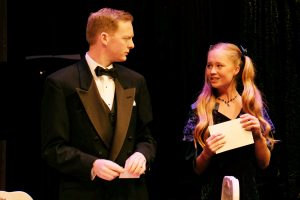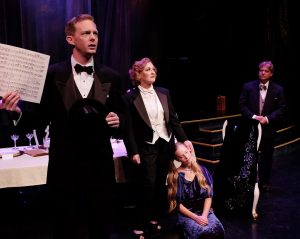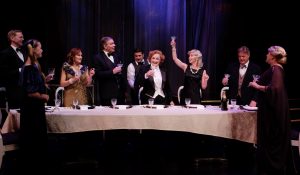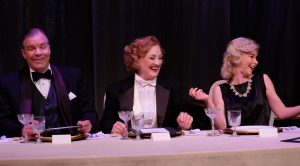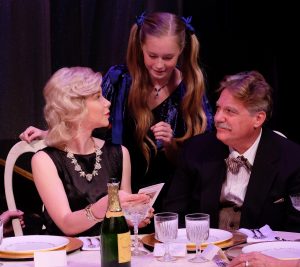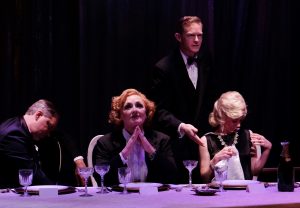LAMB’S SERVES UP A TASTY DINNER WITH MARLENE
There’s an old parlor game of trying to decide: If you could attend a dinner party and choose any guests you wanted around the table, whom would you select? For Eric Hanes, who visited Paris from Sweden in 1938, he might well have picked the people who truly gathered on that October night. For one exciting evening, he was included in an elegant hotel dinner with six high profile individuals.
The result, courtesy of his daughter, playwright Anne-Charlotte Hanes Harvey, is her fictional portrayal of what that evening might have been like, piecing together the stories her father told her. Harvey is clear in her notes that the dialogue, personalities, and even the names of lesser characters are sourced by her own imagination, but the setting, circumstances, tensions, and major players are based on Hanes’ accounts of this evening shortly before France joined the war.
Most notable at the table is international film legend Marlene Dietrich (Deborah Gilmour-Smyth), born and raised in Germany. At her side, we find her long-time love partner Erich Maria Ramarque (Jason Heil), best known as the author of the 1929 classic, All Quiet On The Western Front, and Marlene’s precocious 13-year-old daughter Maria (Avery Trimm). Austrian classical violinist/composer Fritz Kreisler (John Rosen) attends as does Woolworth’s heiress and popular American socialite/philanthropist Barbara Hutton (the delightfully humorous Rachael Van Wormer).
The party is being thrown by Leonore Wolff (Kerry Meads), owner of the elegant Lancaster Hotel, who has also invited her close friend Bernadine Boubiel (Cynthia Gerber), a wealthy antique dealer who glitters with expensive jewels. Hanes himself (Brain Mackey) is all aflutter inside at the celebrity gathering, but cautiously genteel as he tries to fit in. He fares well, despite feeling far out of his league, counting on coaching from wise-for-her-age Maria throughout the evening.
Décor by Mike Buckley and costuming by Jeanne Reith set the period piece nicely, as we’re introduced to Hanes. He and young Maria set the stage with conversation to let us know who all the players are and what Maria thinks of each of them. The problem is that, with so many names and no faces yet to associate with them, it is a challenge to digest it all and a bit dry going on for as long as it does. When we finally meet all the attendees, most of Act I is spent dabbling in a social graces and making it clear that the attendees are determined to avoid talking about politics, which is clearly the main thing on almost everyone’s mind. In the end, the first act feels a little long and may lose some attendees who aren’t drawn to the pomp and circumstance of the period. Fortunately, there’s just enough intrigue in the last ten minutes of the act to give us hope for Act II − and that hope is genuinely fulfilled.
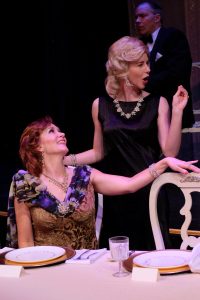 As the champagne flows and their guards come down, the second act reveals a grittier tale that lies behind the smiles of these people. Gilmore-Smyth, who nails Dietrich’s persona in Act I becomes fascinating to watch as she tries to unearth the truth behind the facades of certain guests. With French loyalties split, Austria already in Hitler’s hands, and Dietrich being courted by the Third Reich, there’s plenty for these guests to get off their chests once they stop holding back; the resulting drama makes for provocative theatre. Kudos to both Harvey’s writing of and Trimm’s portrayal of Maria who could have been a distraction from the main storyline (or even an annoying source of petulance) but instead is a welcome voice that propels the story. By the end, Harvey’s tale under Robert Smyth’s direction is captivating, movingly performed, and grounds for great post-theatre discussion about that time in history and the darkness that shaped a dangerous culture that we cannot − and must not − ever forget.
As the champagne flows and their guards come down, the second act reveals a grittier tale that lies behind the smiles of these people. Gilmore-Smyth, who nails Dietrich’s persona in Act I becomes fascinating to watch as she tries to unearth the truth behind the facades of certain guests. With French loyalties split, Austria already in Hitler’s hands, and Dietrich being courted by the Third Reich, there’s plenty for these guests to get off their chests once they stop holding back; the resulting drama makes for provocative theatre. Kudos to both Harvey’s writing of and Trimm’s portrayal of Maria who could have been a distraction from the main storyline (or even an annoying source of petulance) but instead is a welcome voice that propels the story. By the end, Harvey’s tale under Robert Smyth’s direction is captivating, movingly performed, and grounds for great post-theatre discussion about that time in history and the darkness that shaped a dangerous culture that we cannot − and must not − ever forget.
photos by Ken Jacques
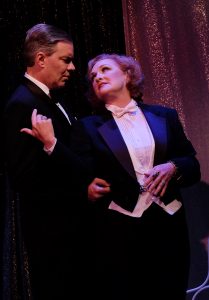 Dinner With Marlene
Dinner With Marlene
Lamb’s Players Theatre
1142 Orange Ave in Coronado
ends on May 29, 2016
for tickets, call 619.437.6000 or visit Lamb’s

